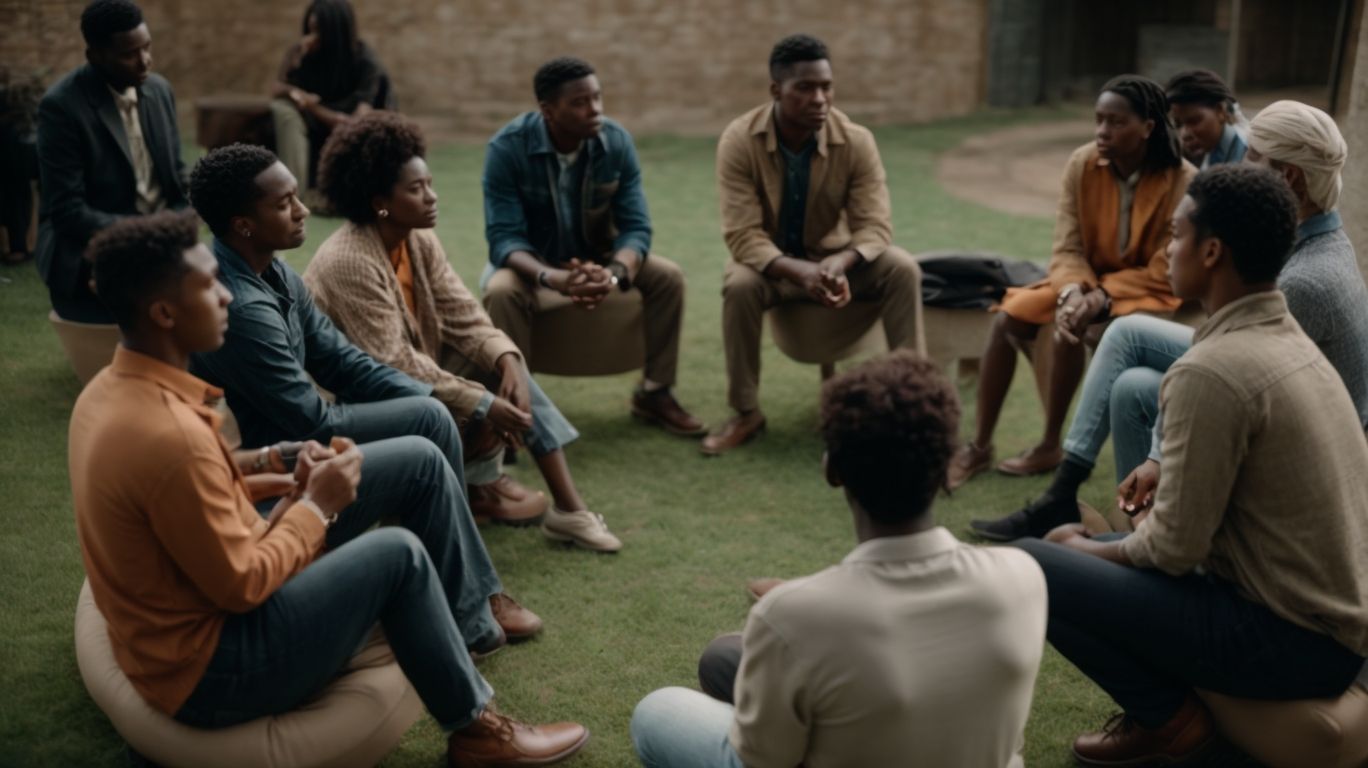Conflict is a natural part of human interaction, but when left unresolved, it can have detrimental effects on personal relationships, work environments, and communities.
In psychology, conflict resolution techniques are used to address and manage different types of conflicts. From active listening to negotiation and mediation, there are various strategies that can be applied in different settings.
The benefits of conflict resolution are numerous, including improved communication, enhanced relationships, increased productivity, and reduced stress.
Learning and practicing conflict resolution can be done through therapy, workshops, or self-help resources. In this article, we will explore the different aspects of conflict resolution in psychology, from its techniques and applications to its benefits and how to learn and practice it.
Contents
- 1 Key Takeaways:
- 2 What Is Conflict Resolution in Psychology?
- 3 What Are the Techniques Used in Conflict Resolution?
- 4 How Can Conflict Resolution Be Applied in Different Settings?
- 5 What Are the Benefits of Conflict Resolution?
- 6 How Can One Learn and Practice Conflict Resolution?
- 7 Frequently Asked Questions
- 7.1 What is conflict resolution in psychology?
- 7.2 What techniques are used in conflict resolution in psychology?
- 7.3 How is conflict resolution applied in psychology?
- 7.4 What are the benefits of understanding conflict resolution in psychology?
- 7.5 Can conflict resolution in psychology be beneficial in personal relationships?
- 7.6 How can learning about conflict resolution in psychology improve workplace dynamics?
Key Takeaways:
- Conflict resolution in psychology is the process of finding a peaceful and mutually beneficial solution to conflicts and disagreements.
- Effective techniques for conflict resolution include active listening, collaborative problem solving, negotiation, and mediation.
- Conflict resolution can be applied in various settings such as personal relationships, workplace, and community, leading to improved communication, enhanced relationships, increased productivity, and reduced stress.
What Is Conflict Resolution in Psychology?
Conflict resolution in psychology refers to the process of managing and resolving conflicts in a constructive and peaceful manner, often focusing on enhancing communication, understanding, and emotional regulation between conflicting parties.
This process involves the use of various techniques and strategies, such as active listening, empathy, and negotiation, to help individuals navigate through disagreements and reach a mutually satisfactory outcome.
Conflict resolution plays a crucial role in fostering healthy relationships, whether in personal, professional, or social settings. By addressing underlying emotions and promoting effective dialogue, it cultivates an environment where individuals can express their concerns, seek common ground, and work towards solutions that benefit all parties involved.
What Are the Different Types of Conflict?
Conflicts can manifest in various forms, including interpersonal conflicts between individuals, intrapersonal conflicts within oneself, and intergroup conflicts among different parties, each presenting unique challenges and dynamics.
Interpersonal conflicts often arise due to differences in opinions, values, or personalities, leading to tension and discord within relationships.
Intrapersonal conflicts, on the other hand, involve internal struggles such as decision-making dilemmas or conflicting emotions.
Intergroup conflicts can occur between teams, organizations, or communities, usually stemming from competition, resource allocation, or ideological differences.
What Are the Techniques Used in Conflict Resolution?
A variety of techniques are employed in conflict resolution, encompassing active listening, collaborative problem solving, negotiation, and mediation, each aiming to foster understanding, empathy, and effective communication among conflicting parties.
Active listening involves fully concentrating, understanding, responding, and remembering what is being said. It also involves acknowledging emotions and non-verbal cues to demonstrate understanding and empathy.
Collaborative problem solving entails working together to find mutually acceptable solutions. This approach focuses on common interests and needs to reach a resolution beneficial for all parties involved.
Negotiation emphasizes open communication and compromise to achieve a satisfactory agreement. It involves considering interests, options, and alternatives to find a mutually beneficial solution.
Mediation utilizes a neutral third party to facilitate dialogue, encourage understanding, and guide the disputants in reaching a solution acceptable to all. This approach focuses on creating an environment of cooperation and communication that leads to a sustainable resolution.
Active Listening
Active listening is a fundamental technique in conflict resolution, emphasizing the importance of attentively processing and understanding the speaker’s words, emotions, and perspectives to establish empathetic and effective communication.
By actively engaging with the speaker and demonstrating genuine interest in their thoughts and feelings, active listening not only facilitates open and honest communication but also nurtures trust and rapport.
This approach invites individuals to express themselves fully, knowing that they are being heard and valued, thus creating a safe space for dialogue and understanding.
Moreover, active listening plays a pivotal role in recognizing and acknowledging diverse perspectives, even amid conflicting viewpoints. It allows for a deeper comprehension of others’ positions, paving the way for mutually beneficial solutions and harmonious resolutions.
The act of actively listening conveys respect and validation, which are essential components in defusing tensions and fostering empathy and understanding in moments of conflict.
Collaborative Problem Solving
Collaborative problem solving involves the joint effort of conflicting parties to identify and implement mutually beneficial solutions, emphasizing teamwork, creativity, and the pursuit of win-win outcomes in conflict resolution.
This approach often begins with mediation or negotiation, where all stakeholders are encouraged to actively participate in the problem-solving process.
It requires fostering an open and respectful atmosphere to allow diverse perspectives and ideas to surface. Moreover, collaborative problem solving also leverages the expertise and experience of all involved parties, ensuring that the resolution reflects the collective input and understanding.
Negotiation
Negotiation in conflict resolution involves the process of reaching compromises and agreements through constructive communication, strategic exchanges, and the exploration of common interests and needs.
Effective negotiation encompasses a set of principles and practices that foster mutual understanding and facilitate the resolution of disputes.
Active listening and empathy play crucial roles in acknowledging the perspectives of all parties involved, paving the way for open dialogue.
The use of language that reflects respect and cooperation, coupled with the skillful art of persuasion, supports the negotiation process.
Acknowledging the potential for win-win outcomes, and being receptive to alternative solutions, enhances the likelihood of achieving mutually beneficial agreements.
Mediation
Mediation serves as a facilitated process where a neutral third party assists conflicting individuals or groups in reaching mutually acceptable resolutions, promoting open dialogue, and guiding constructive interactions.
This approach helps the conflicting parties to better understand each other’s perspective and interests, thereby enabling them to work together towards finding mutually beneficial solutions.
Through mediation, the neutral third party encourages the parties to communicate effectively, brainstorm options, and ultimately come to an agreement that addresses the root causes of the conflict.
By fostering constructive interactions, mediation aims to restore trust and establish a foundation for future cooperation and interactions between the conflicting parties.
How Can Conflict Resolution Be Applied in Different Settings?
Conflict resolution principles and techniques can be effectively applied across diverse settings such as personal relationships, professional environments, and community interactions, promoting understanding, collaboration, and constructive problem-solving.
For instance, in personal relationships, conflict resolution methods enable individuals to navigate disagreements and strengthen their bonds through improved communication and mutual respect.
In professional environments, these principles foster collaboration and enhance productivity by mitigating conflicts, fostering a positive work environment.
In community interactions, conflict resolution nurtures understanding and cooperation, leading to the achievement of shared goals and the strengthening of social cohesion.
Personal Relationships
In personal relationships, conflict resolution techniques play a vital role in nurturing empathy, fostering effective communication, and strengthening the bonds between individuals, contributing to healthier and more harmonious interactions.
Effective conflict resolution encourages individuals to actively listen to each other, understand differing perspectives, and find mutually beneficial solutions. By practicing empathy, individuals can develop a deeper understanding of their partner’s feelings, experiences, and needs, leading to a more compassionate and supportive connection.
Honing communication skills through conflict resolution enables individuals to express their thoughts and emotions constructively, minimizing misunderstandings and building trust. When conflicts are resolved with respect and open dialogue, it cultivates an environment of openness and honesty within the relationship.
Mastering relationship dynamics through conflict resolution fosters mutual respect, cooperation, and compromise, ultimately strengthening the foundation of the relationship. It allows individuals to navigate through challenges, grow together, and build a resilient and fulfilling partnership.
Workplace
In the workplace, conflict resolution techniques are instrumental in enhancing productivity, fostering effective teamwork, and creating a positive and harmonious professional environment conducive to growth and innovation.
When conflict arises in the workplace, it can lead to decreased productivity and hinder the overall success of the organization. By implementing strategic conflict resolution strategies, such as active listening, mediation, and negotiation, teams can address and resolve issues in a constructive manner.
This not only promotes collaboration and trust among team members but also contributes to a positive organizational culture.
Community
Within communities, conflict resolution practices facilitate collaboration, mutual support, and the cultivation of cohesive social environments that prioritize understanding, respect, and collective well-being.
Conflict resolution plays a crucial role in maintaining a harmonious atmosphere within communities. By addressing conflicts effectively, it enables individuals and groups to work together towards common goals, fostering a sense of unity and cooperation.
Moreover, conflict resolution approaches promote empathy and active listening, enabling community members to understand diverse perspectives and find mutually beneficial solutions. This, in turn, creates an environment where individuals feel heard, valued, and supported.
Such practices ultimately lead to the establishment of strong social ties and a shared sense of responsibility for the well-being of the community as a whole.
What Are the Benefits of Conflict Resolution?
Conflict resolution yields a myriad of benefits, including improved communication, enhanced relationships, increased productivity, and reduced stress and tension, contributing to the well-being and positive dynamics in personal, professional, and communal contexts.
Improved communication resulting from conflict resolution fosters clear and open dialogue, leading to a deeper understanding of each other’s perspectives and needs. This, in turn, creates a foundation for building stronger and more trusting relationships.
The resolution of conflicts reduces the time and energy spent on discord, allowing individuals and teams to channel their efforts towards increased productivity.
The reduction of stress and tension as a consequence of resolving conflicts results in a healthier and more harmonious environment.
Improved Communication
One of the primary benefits of conflict resolution is the promotion of improved communication, fostering deeper understanding, empathy, and constructive dialogue among conflicting parties, enabling more effective and harmonious interactions.
Improved communication is pivotal in conflict resolution as it allows individuals to express their viewpoints, concerns, and needs more clearly and sensitively.
When communication is enhanced, it becomes easier for conflicting parties to comprehend each other’s perspectives, leading to a greater sense of understanding and empathy.
This in turn fosters the development of constructive dialogue, paving the way for mutually beneficial solutions and compromises.
Through effective communication, conflicts can be addressed with sincerity and consideration, laying the groundwork for sustainable resolutions.
Enhanced Relationships
Conflict resolution contributes to the enhancement of relationships by fostering trust, respect, and mutual understanding, laying the foundation for healthier, more resilient, and harmonious connections among individuals and groups.
When conflicts are effectively resolved, it creates an atmosphere of trust where individuals feel safe to express their concerns openly, knowing that their feelings and perspectives are valued.
This, in turn, leads to a more profound level of mutual understanding as communication barriers are dismantled, allowing for meaningful and constructive dialogue.
Respect flourishes as conflicts are managed gracefully, leading to a deeper appreciation and consideration for each other’s viewpoints and emotions.
All these elements combined form the bedrock for a healthier and more resilient relationship, fostering an environment where individuals and groups can thrive and grow together.
Increased Productivity
Conflict resolution efforts lead to increased productivity by promoting effective teamwork, collaborative problem-solving, and a conducive work environment that maximizes efficiency and innovation.
When conflicts are properly managed, teams can focus on their tasks and goals without the distraction of ongoing disputes. This creates a harmonious working atmosphere, boosting morale and encouraging creativity.
Collaborative problem-solving fosters a sense of unity and enhances communication skills among team members, leading to smoother task execution and enhanced outcomes.”
Reduced Stress and Tension
Conflict resolution plays a pivotal role in reducing stress and tension, contributing to the overall well-being and mental health of individuals and groups by fostering harmonious and supportive environments.
When conflicts are resolved amicably, individuals experience a significant reduction in stress levels, as the burden of unresolved issues is lifted from their shoulders. This, in turn, leads to a renewed sense of calmness and emotional stability, positively impacting their mental and emotional well-being.
The creation of a supportive environment through conflict resolution promotes trust and solidarity, allowing individuals to feel valued and understood.
How Can One Learn and Practice Conflict Resolution?
Individuals can acquire and hone conflict resolution skills through various avenues such as therapy or counseling, conflict resolution workshops or trainings, and self-help books or resources, give the power toing them to navigate conflicts effectively and constructively.
Therapy or counseling provides individuals with a safe and supportive environment to explore the root causes of conflicts, understand their own and others’ perspectives, and learn healthy communication and problem-solving techniques.
Conflict resolution workshops or trainings offer practical tools, role-playing scenarios, and group discussions to enhance understanding and application of conflict resolution strategies.
Self-help books or resources provide accessible and flexible ways for individuals to self-reflect, learn about conflict styles, and practice strategies for managing and resolving conflicts in different contexts.
Therapy or Counseling
Therapy or counseling sessions with skilled professionals offer individuals the opportunity to learn and practice conflict resolution, addressing personal and interpersonal dynamics while enhancing mental health and emotional well-being.
Through therapy, individuals can develop a better understanding of their emotions, triggers, and reactions, which are essential components of conflict resolution.
The therapeutic process helps people hone their communication skills, empathy, and perspective-taking, all of which are vital in managing and resolving conflicts effectively.
Therapy provides a safe space for individuals to explore their feelings and experiences, enabling them to develop healthier coping mechanisms and emotional regulation, which are crucial in conflict situations.
Conflict Resolution Workshops or Trainings
Conflict resolution workshops and trainings provide structured environments for individuals to develop and refine conflict resolution skills through interactive activities, role-playing exercises, and practical learning experiences.
Through interactive activities, participants engage in real-life scenarios that simulate conflict situations, allowing them to practice communication, negotiation, and empathy.
Role-playing exercises offer opportunities to step into various perspectives, enhancing understanding and empathy.
Practical learning experiences, such as case studies and group discussions, enable attendees to apply theoretical knowledge to real-world situations, fostering a deeper understanding of conflict dynamics and resolution strategies.
Self-Help Books or Resources
Self-help books and resources on conflict resolution offer individuals valuable insights, understanding, and practical exercises to enhance their conflict management and resolution abilities in diverse personal and professional contexts.
The wide array of self-help books and resources available provide a range of strategies, techniques, and perspectives to help individuals navigate and overcome conflicts.
These resources often delve into the psychology of conflict, offering readers the necessary tools to understand the root causes of conflicts and devise effective solutions.
Through engaging exercises, individuals can practice communication skills, empathy, and negotiation techniques, which are essential in mitigating and resolving conflicts.
Self-help resources also often feature real-life case studies and examples, allowing readers to apply theoretical knowledge to practical scenarios. By incorporating these materials into their daily routines, individuals can proactively develop their conflict resolution skills and build the confidence to handle challenging situations.
Frequently Asked Questions
What is conflict resolution in psychology?
Conflict resolution in psychology is the process of addressing and managing conflicts in a constructive and effective manner. It involves understanding the root causes of a conflict and finding ways to resolve it in a healthy and productive way.
What techniques are used in conflict resolution in psychology?
There are various techniques used in conflict resolution in psychology, including active listening, problem-solving, negotiation, and mediation. These techniques aim to improve communication, find common ground, and reach a mutually beneficial solution.
How is conflict resolution applied in psychology?
Conflict resolution is applied in various settings in psychology, such as therapy, counseling, and organizational psychology. It is used to help individuals and groups navigate conflicts and improve relationships, leading to better overall mental health and well-being.
What are the benefits of understanding conflict resolution in psychology?
Understanding conflict resolution in psychology can lead to improved communication skills, better problem-solving abilities, and the ability to manage conflicts in a healthy and productive way. This can result in healthier relationships and improved mental and emotional well-being.
Can conflict resolution in psychology be beneficial in personal relationships?
Yes, conflict resolution techniques used in psychology can be applied to personal relationships, such as romantic partnerships, friendships, and family dynamics. These techniques can improve communication and help individuals navigate conflicts in a healthy and productive way.
How can learning about conflict resolution in psychology improve workplace dynamics?
Conflict resolution techniques used in psychology can greatly benefit workplace dynamics by improving communication, reducing conflicts, and promoting a more positive and collaborative work environment. This can lead to increased productivity and job satisfaction for individuals.





